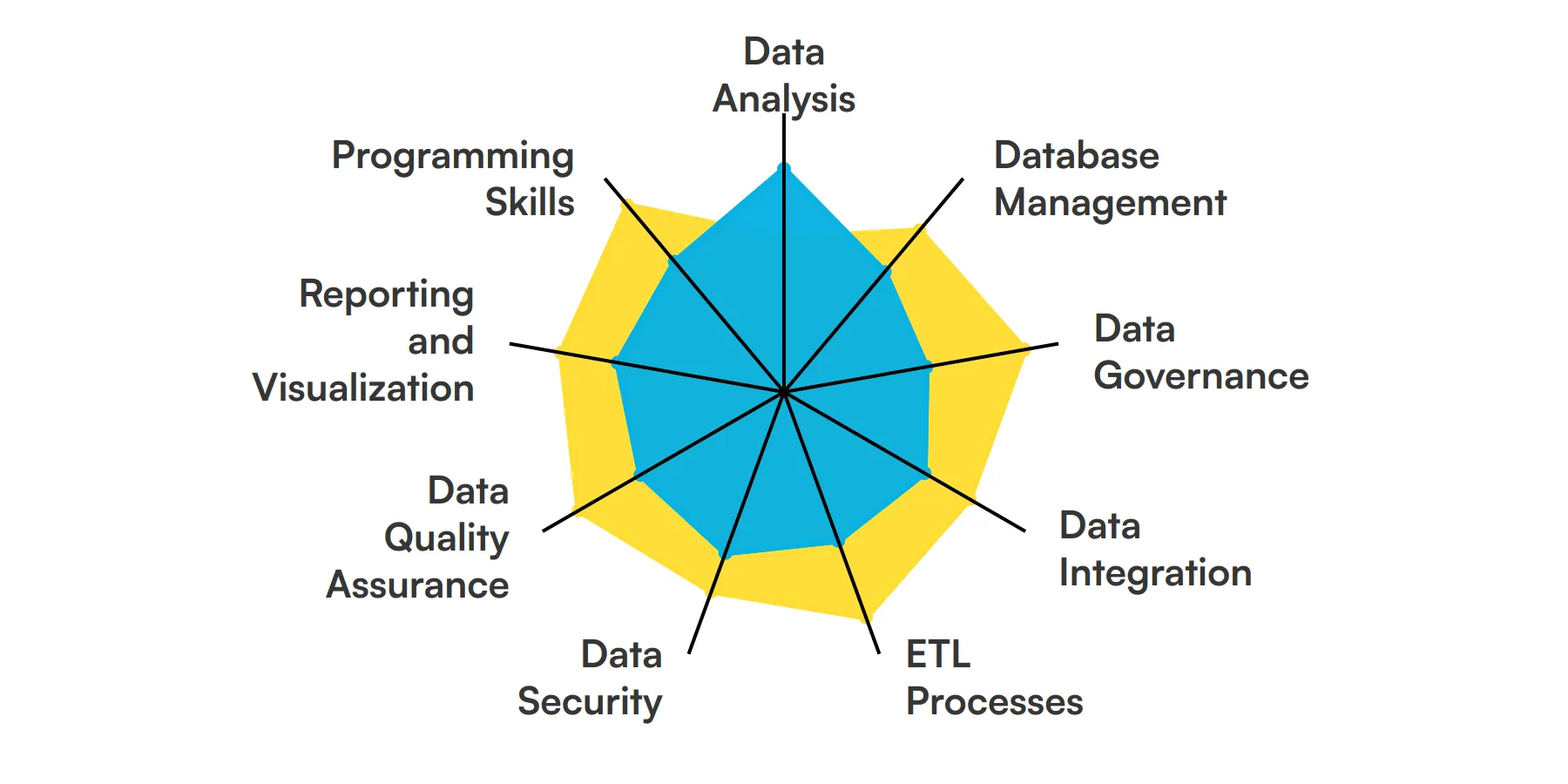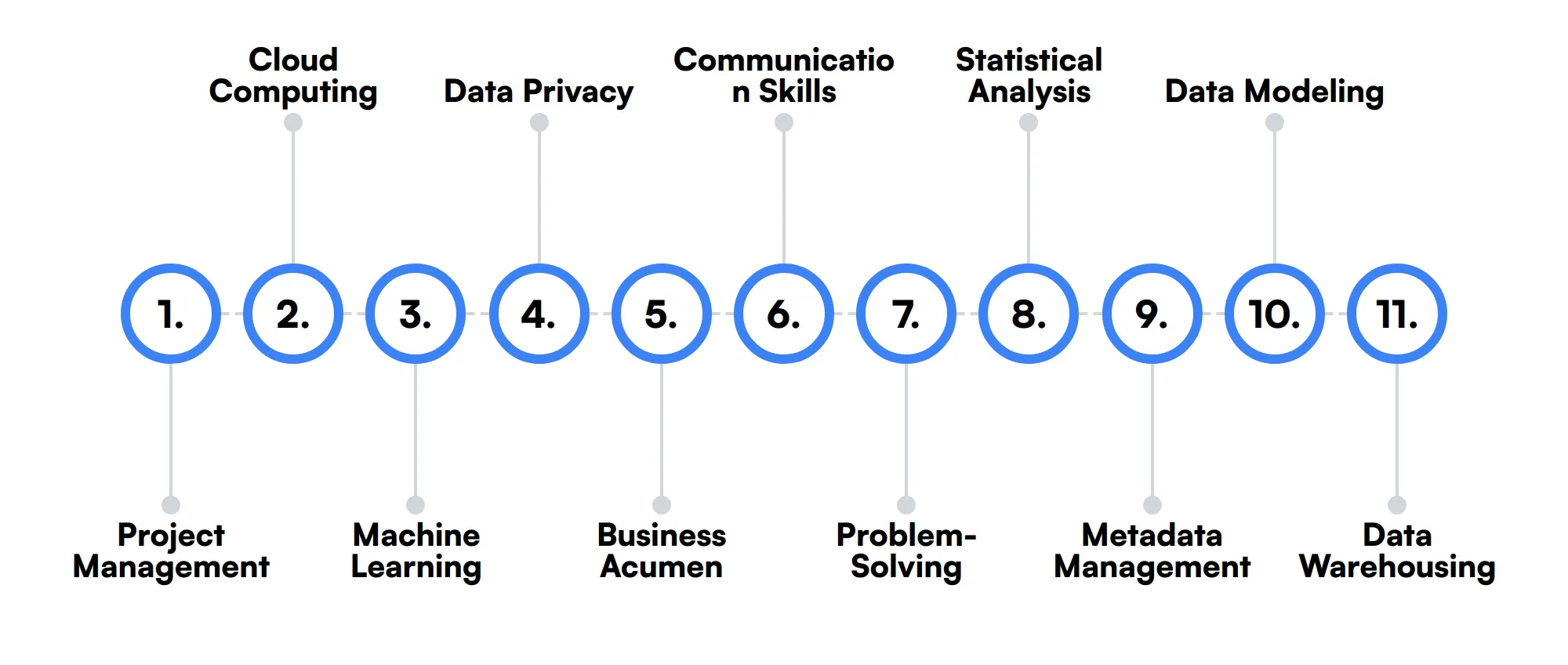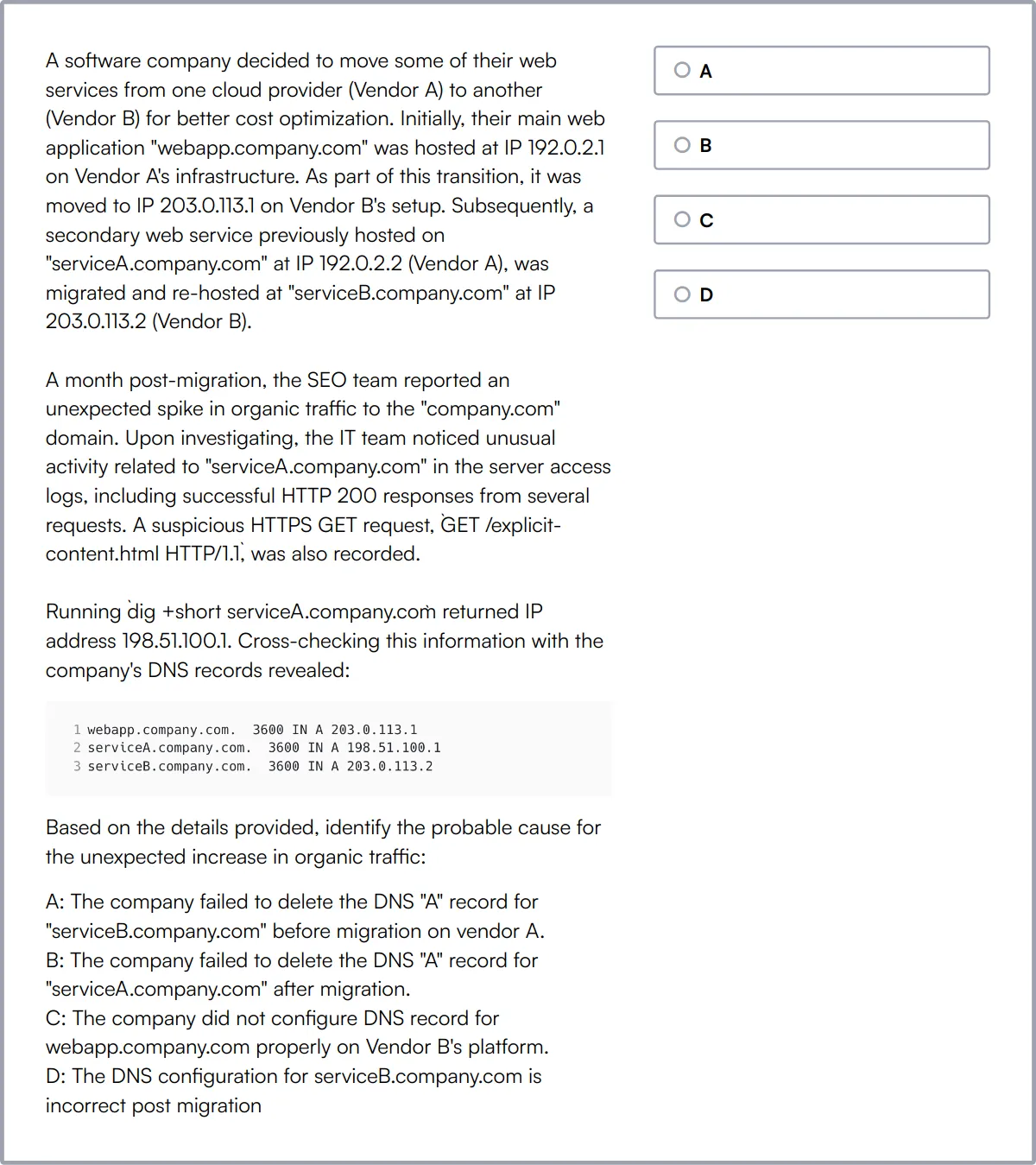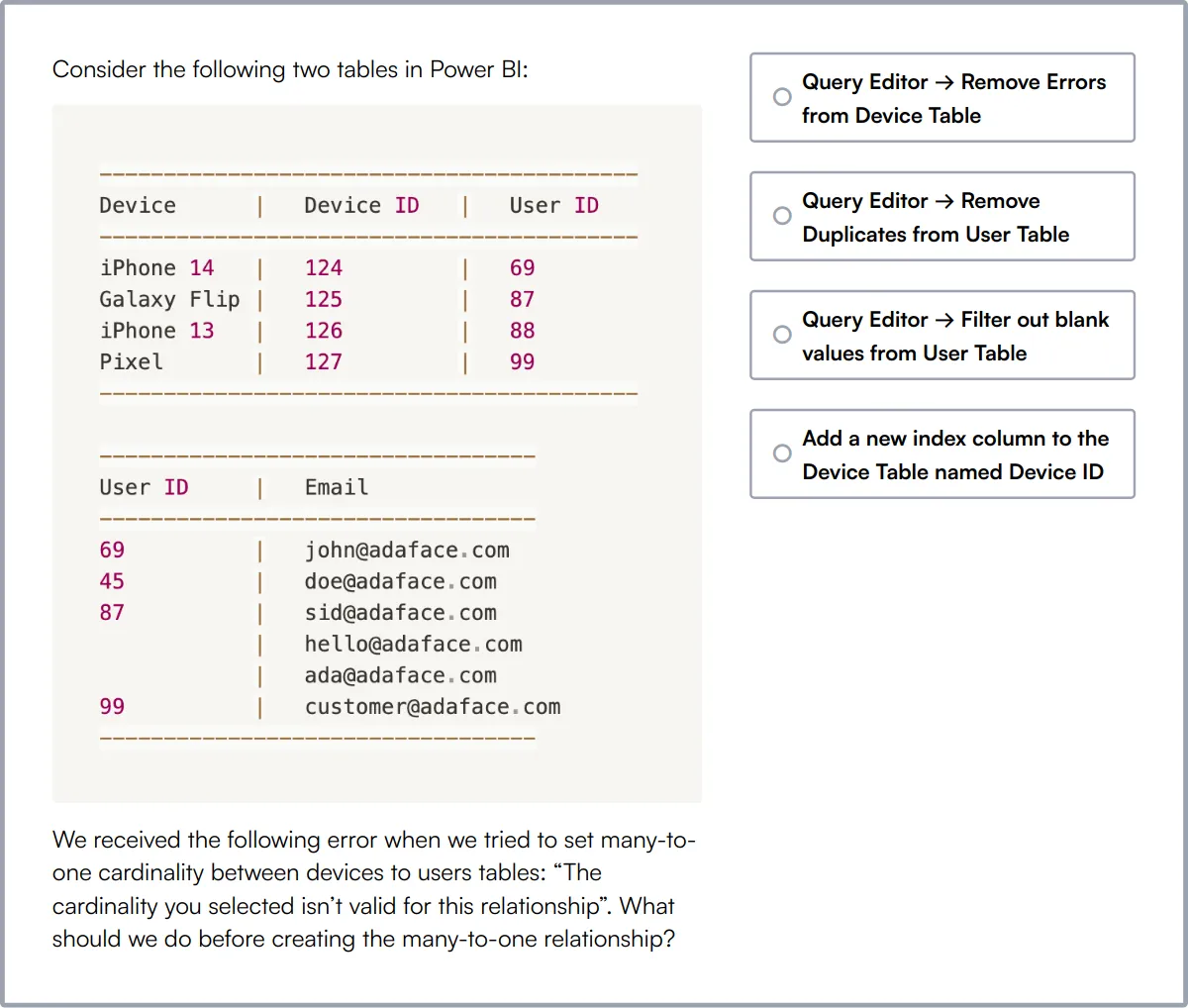Data Managers are at the heart of today's data-driven industries, ensuring that data is accurate, accessible, and secure. Their role is crucial in leveraging data for strategic decision-making and operational efficiency.
Skills required for a Data Manager include proficiency in database management systems, understanding of data privacy laws, and abilities in data analysis and reporting. Additionally, strong organizational and communication skills are essential.
Candidates can write these abilities in their resumes, but you can’t verify them without on-the-job Data Manager skill tests.
In this post, we will explore 9 essential Data Manager skills, 11 secondary skills and how to assess them so you can make informed hiring decisions.
Table of contents
9 fundamental Data Manager skills and traits
The best skills for Data Managers include Data Analysis, Database Management, Data Governance, Data Integration, ETL Processes, Data Security, Data Quality Assurance, Reporting and Visualization and Programming Skills.
Let’s dive into the details by examining the 9 essential skills of a Data Manager.

Data Analysis
Data Managers need to be adept at analyzing large datasets to extract meaningful insights. This skill helps in identifying trends, patterns, and anomalies that can inform business decisions.
For more insights, check out our guide to writing a Data Analyst Job Description.
Database Management
Managing databases involves ensuring data integrity, security, and availability. A Data Manager must be proficient in database software like SQL to maintain and optimize data storage solutions.
Data Governance
Implementing data governance policies ensures data quality and compliance with regulations. Data Managers use this skill to establish standards and procedures for data handling and usage.
Data Integration
Combining data from different sources into a unified view is crucial. Data Managers use integration tools to ensure seamless data flow across systems, enhancing data accessibility and usability.
Check out our guide for a comprehensive list of interview questions.
ETL Processes
Extract, Transform, Load (ETL) processes are essential for data migration and warehousing. Data Managers design and manage ETL workflows to ensure data is accurately transferred and transformed.
Data Security
Protecting data from unauthorized access and breaches is paramount. Data Managers implement security measures like encryption and access controls to safeguard sensitive information.
For more insights, check out our guide to writing a Cyber Security Analyst Job Description.
Data Quality Assurance
Ensuring data accuracy and consistency is critical. Data Managers perform regular audits and validation checks to maintain high data quality standards.
Reporting and Visualization
Creating reports and visualizations helps in communicating data insights effectively. Data Managers use tools like Tableau or Power BI to present data in an understandable format.
Programming Skills
Knowledge of programming languages like Python or R is beneficial for automating data tasks and performing advanced analytics. Data Managers often write scripts to streamline data processes.
11 secondary Data Manager skills and traits
The best skills for Data Managers include Project Management, Cloud Computing, Machine Learning, Data Privacy, Business Acumen, Communication Skills, Problem-Solving, Statistical Analysis, Metadata Management, Data Modeling and Data Warehousing.
Let’s dive into the details by examining the 11 secondary skills of a Data Manager.

Project Management
Managing data projects requires planning, execution, and monitoring. Data Managers use project management skills to ensure timely and successful project delivery.
Cloud Computing
Familiarity with cloud platforms like AWS or Azure is useful for managing data storage and processing in the cloud. Data Managers leverage cloud services for scalable and flexible data solutions.
Machine Learning
Understanding machine learning concepts can enhance data analysis capabilities. Data Managers may use machine learning models to predict trends and automate decision-making processes.
Data Privacy
Knowledge of data privacy laws and regulations is important for compliance. Data Managers ensure that data handling practices adhere to legal requirements to protect user privacy.
Business Acumen
Understanding the business context helps in aligning data strategies with organizational goals. Data Managers use business acumen to prioritize data initiatives that drive value.
Communication Skills
Effective communication is key to collaborating with stakeholders. Data Managers need to explain complex data concepts in a clear and concise manner to non-technical audiences.
Problem-Solving
Identifying and resolving data-related issues is a common task. Data Managers use problem-solving skills to troubleshoot and fix data discrepancies and system errors.
Statistical Analysis
Applying statistical methods helps in making data-driven decisions. Data Managers use statistical analysis to interpret data and validate findings.
Metadata Management
Managing metadata involves organizing and maintaining data about data. Data Managers use this skill to ensure data is easily searchable and well-documented.
Data Modeling
Creating data models helps in structuring data for efficient storage and retrieval. Data Managers design data models to represent complex data relationships accurately.
Data Warehousing
Building and maintaining data warehouses is essential for large-scale data storage. Data Managers use warehousing techniques to consolidate data from various sources for analysis.
How to assess Data Manager skills and traits
Assessing the skills and traits of a Data Manager can be a challenging task, given the diverse range of competencies required for the role. From data analysis and database management to data governance and integration, a Data Manager must possess a comprehensive skill set to handle the complexities of modern data environments.
Traditional resumes and certifications may provide a snapshot of a candidate's qualifications, but they often fall short in revealing the true depth of their abilities. Skills-based hiring practices, such as talent assessments, offer a more reliable way to evaluate a candidate's proficiency and suitability for the role.
For instance, Adaface on-the-job skill tests can help you assess key areas like ETL processes, data security, and data quality assurance, leading to a 2x improved quality of hires. These assessments are designed to give you a clear picture of a candidate's capabilities, ensuring that you make informed hiring decisions.
Let’s look at how to assess Data Manager skills with these 6 talent assessments.
Data Analysis Test
Our Data Analysis Test evaluates a candidate's ability to analyze and interpret data effectively, crucial for roles requiring data-driven decision making.
The test assesses skills in data modeling, analysis, SQL queries, and the use of tools like Excel to manage and visualize data.
Candidates who perform well demonstrate a strong ability to predict outcomes, detect anomalies, and provide actionable insights through data interpretation and business analysis.

MySQL Online Test
Our MySQL Online Test measures proficiency in MySQL, focusing on database management and manipulation skills.
It evaluates knowledge in areas such as SQL queries, database design, normalization, and advanced features like indexing and transactions.
Successful candidates will show a deep understanding of database operations and the ability to optimize SQL queries for performance and accuracy.

Informatica Online Test
The Informatica Online Test assesses a candidate's expertise in using Informatica PowerCenter for ETL processes.
This test covers data warehousing, data integration, and the ability to design and manage ETL solutions using various PowerCenter features.
High scorers are proficient in managing complex data transformation scenarios and optimizing data workflows to enhance data integration and quality.
Cyber Security Assessment Test
Our Cyber Security Assessment Test evaluates a candidate's understanding of network and data security protocols and practices.
The test challenges candidates on cybersecurity threats, defense mechanisms, and the use of cryptography to secure information.
Candidates excelling in this test can effectively identify vulnerabilities, implement security measures, and respond to various cybersecurity incidents.

Informatica Data Quality Online Test
The Informatica Data Quality Online Test gauges a candidate's ability to manage and improve data quality using Informatica tools.
It assesses skills in data profiling, cleansing, standardization, and enrichment crucial for maintaining high data quality standards.
Proficient candidates demonstrate a thorough understanding of data quality processes and the ability to implement strategies that ensure data integrity and reliability.
Power BI Online Test
Our Power BI Online Test assesses a candidate's ability to utilize Power BI for data analysis and report creation.
The test evaluates skills in data modeling, DAX, and the creation of interactive visualizations and reports.
Successful candidates will have a strong grasp of data analytics principles and the ability to leverage Power BI to derive insights and make data-driven decisions.

Summary: The 9 key Data Manager skills and how to test for them
| Data Manager skill | How to assess them |
|---|---|
| 1. Data Analysis | Evaluate a candidate's ability to interpret and derive insights from data. |
| 2. Database Management | Assess skills in managing and optimizing database functionality and performance. |
| 3. Data Governance | Check understanding of data compliance, access control, and policy implementation. |
| 4. Data Integration | Review ability to combine data from different sources into a coherent dataset. |
| 5. ETL Processes | Test knowledge of extracting, transforming, and loading data procedures. |
| 6. Data Security | Examine practices for protecting data against unauthorized access and threats. |
| 7. Data Quality Assurance | Assess methods used to ensure accuracy and reliability of data. |
| 8. Reporting and Visualization | Evaluate proficiency in creating reports and visualizing data for insights. |
| 9. Programming Skills | Test coding ability in relevant programming languages and environments. |
Data Interpretation Assessment Test
Data Manager skills FAQs
What are the key skills required for a Data Manager?
Data Managers need a mix of skills including Data Analysis, Database Management, Data Governance, and Data Security. They should also be proficient in ETL Processes, Data Quality Assurance, and Reporting and Visualization.
How can recruiters assess programming skills for a Data Manager role?
Recruiters can assess programming skills by reviewing candidates' experience with languages like SQL, Python, or R. Coding challenges or practical tests during interviews can also provide insight into their proficiency.
What is the importance of Data Governance in a Data Manager's role?
Data Governance ensures data accuracy, accessibility, consistency, and security within an organization. It involves setting policies and standards for data use, which is critical for compliance and operational effectiveness.
How does Data Integration impact the role of a Data Manager?
Data Integration is key for ensuring that disparate data sources work seamlessly together, enhancing data accessibility and reliability. This skill is crucial for making informed decisions based on comprehensive data views.
What tools can Data Managers use for effective Data Quality Assurance?
Data Managers can use tools like Talend, Informatica, and Data Ladder for ensuring data quality. These tools help in cleaning, validating, and standardizing data, which is essential for accurate reporting and analysis.
Why is Project Management important for Data Managers?
Project Management skills help Data Managers oversee data-related projects, ensuring they are completed on time, within budget, and meet the required standards. This involves planning, executing, and monitoring project progress.
How can Data Privacy be maintained by Data Managers?
Data Managers maintain privacy by implementing policies and technologies that protect sensitive information. Compliance with regulations like GDPR and HIPAA is also enforced to prevent data breaches and ensure user trust.
What role does Cloud Computing play in Data Management?
Cloud Computing offers scalable resources for storing and processing large datasets, facilitating remote data access and collaboration. Knowledge of cloud platforms like AWS, Azure, or Google Cloud is beneficial for modern data management.

40 min skill tests.
No trick questions.
Accurate shortlisting.
We make it easy for you to find the best candidates in your pipeline with a 40 min skills test.
Try for freeRelated posts
Free resources



